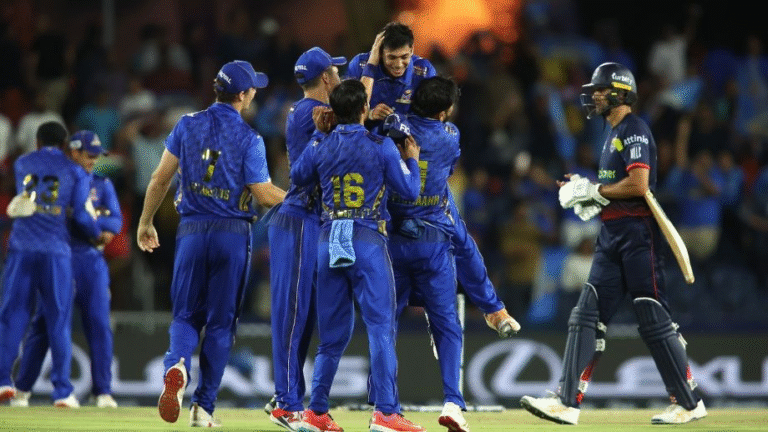
Michael Vaughan initially criticized India’s concussion substitution of Shivam Dube with Harshit Rana, but later admitted England might have done the same under similar circumstances.

Vaughan’s Surprising U-Turn on Controversial Concussion Substitution
In a twist that has left many cricket fans and pundits puzzled, former England captain Michael Vaughan made a surprising U-turn on his stance regarding India’s controversial concussion substitute during their T20I victory over England in Pune on Friday. The substitution of Shivam Dube with Harshit Rana, which occurred after Dube was hit on the helmet by a bouncer, had sparked widespread outrage, particularly from England’s players and commentators.
India secured a tense 15-run victory, sealing the T20I series. However, the match was marred by the contentious concussion substitution that led to heated debates about the fairness of the decision. Dube, who had played a crucial knock of 53 runs, was struck on the helmet by a bouncer from England’s Jamie Overton. After an on-field assessment, Dube was cleared to face the final ball of the over but was later substituted by Harshit Rana under concussion rules.
The Controversy Unfolds
The substitution quickly became a point of contention. Under ICC regulations, concussion substitutes must be “like-for-like,” meaning the player coming in should closely match the role of the injured player. Dube, a batting all-rounder who bowls part-time, was replaced by Rana, a fast bowler who regularly bowls at speeds nearing 90mph. England felt the rule had been violated, sparking strong reactions from the team and former players alike.
Michael Vaughan, in particular, took to social media to express his frustration. He questioned how a bowler like Rana could replace a batter who occasionally bowls, calling the substitution unfair. Vaughan was joined by England skipper Jos Buttler, who also criticized the decision, stating that it wasn’t a “like-for-like” replacement.
However, in a surprising change of tone after the match, Vaughan softened his stance. He conceded that, had England been in a similar position, they too would have likely made the same decision. While he still maintained that Rana wasn’t a “like-for-like” replacement for Dube, Vaughan acknowledged that England might have acted similarly if given the chance to substitute a player under similar circumstances.
Vaughan’s Initial Reaction: “Unfair” Replacement
Vaughan’s initial comments following the controversial substitution were highly critical. On his official X (formerly Twitter) account, he wrote: “How can an out-and-out bowler replace a batter who bowls part-time?” The former England captain was adamant that the substitution violated the principle of “like-for-like” replacements as laid out in the ICC guidelines.
Vaughan’s outrage was shared by many in the cricketing world, especially given the importance of Dube’s knock in India’s total. The substitution seemed to provide India with a tactical advantage, especially since Rana, known for his pace, was able to contribute significantly in the latter stages of the match.
Vaughan’s Unexpected U-Turn: “England Would Have Done the Same”
Following the match, Vaughan made a surprising shift in his views. While he still questioned the fairness of the substitution, he admitted that if England had been in a similar situation, they would have likely made the same decision. Vaughan’s statement was a rare admission of flexibility and sportsmanship.
“I have to say, the substitute, how did they find Harshit Rana as a like-to-like for Shivam Dube? An out-and-out bowler to replace a batter that bowls some part-time stuff is beyond me,” Vaughan said. “England would have done the same by the way, if they had a chance to replace the player. But, you can’t tell me that Harshit is a like-to-like replacement for Shivam Dube.”
This shift in Vaughan’s stance has generated mixed reactions from fans. While some appreciated his honesty, others felt his initial reaction was overly critical of India’s tactics. It’s clear that Vaughan’s comments reflect the complex nature of such rules, which can often be open to interpretation.
Buttler’s Criticism: “Not a Like-for-Like Replacement”
England’s captain, Jos Buttler, was also vocal in his criticism of the decision. Speaking at the post-match press conference, Buttler expressed his disagreement with the substitution, emphasizing that it did not meet the “like-for-like” criteria set by the ICC.
“We don’t agree with the concussion substitute. It’s not a like-for-like replacement,” Buttler said, making it clear that the decision was controversial from England’s perspective. Buttler also made light of the situation, saying, “I think either Shivam Dube put on 25 mph with the ball or Harshit Rana has improved a lot with his batting,” suggesting that the switch seemed far from straightforward.
Despite this, Buttler acknowledged that Rana had played a key role in India’s victory, taking three crucial wickets, including those of Liam Livingstone. His contribution added to the sense that the substitution had played a pivotal role in turning the match in India’s favor.
Conclusion: A Gray Area in Concussion Substitution Rules
The controversy surrounding the concussion substitute of Shivam Dube for Harshit Rana raises important questions about the interpretation and implementation of concussion replacement rules in cricket. While the “like-for-like” criteria are clear on paper, situations like these highlight the complexities involved in ensuring fairness.
Michael Vaughan’s sudden U-turn reflects the ambiguity that exists in such decisions, where even former players struggle to reconcile the fairness of the rule with the tactics employed in the heat of the moment. In the end, the decision stands, but it will likely continue to spark debate for some time, particularly as teams and officials seek clearer guidelines on concussion substitutes moving forward.






